-
Deutscher Männerchor Freiburg
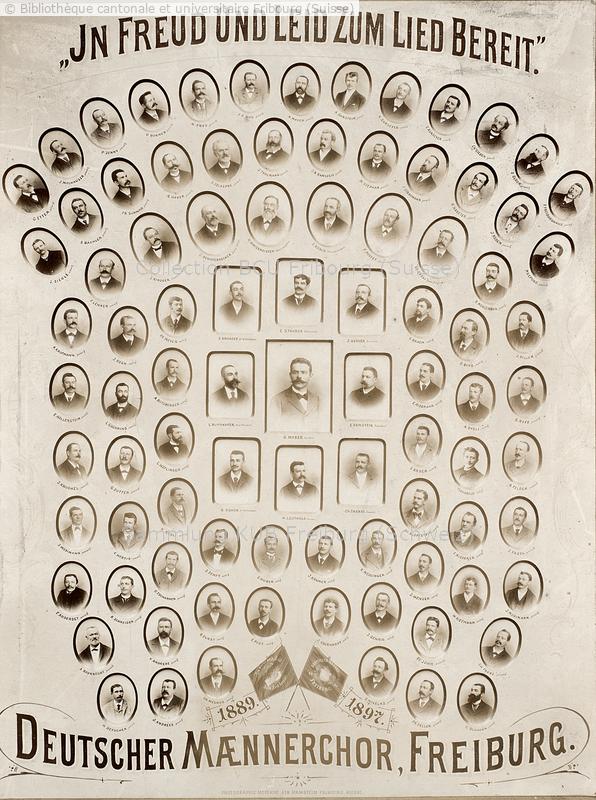
This 1897 image of the Deutsche Männerchor Freiburg (German Male Choir Freiburg) leads one to believe that this choir was simply founded in 1889. Yet, its early years were more eventful than that.
The choir was actually founded in 1878 under the name Union des Ateliers du chemin de fer Fribourg (Union of Railway Workshops Fribourg).
In 1889 the choir revised its statutes, abandoned its link with the railway workshop, and changed its name to Deutscher Männerchor Freiburg.
Twelve years later, in 1901, the Deutsche Männerchor Freiburg and the Deutsche gemischte Chor Freiburg merged into one singing society with two sections — a men’s choirs and a mixed choir — under the common name Deutscher gemischter Chor und Männerchor Freiburg.
Finally, in 1927 the society was renamed Gemischter Chor und Männerchor Freiburg (Mixed Choir and Male Choir Freiburg).
-
Société Cantonale des Chanteurs Fribourgeois
The Société Cantonale des Chanteurs Fribourgeois (Cantonal Singing Society of Fribourg) was founded in Estavayer-le-Lac in October 1849. It held its second meeting in Fribourg on 18 May 1851. The choral societies of Fribourg, Estavayer, Chiètres/Kerzers, Fräschels, Morat/Murten and Lourtens/Lurtigen took part in this festival. The Berner Liedertafel was the special guest. On its performance, Louis Ruffieux wrote one hundred years later:
“The highlight of the festival in Fribourg on 18 May was the participation of the « Liedertafel » of Bern which, preceded by two bears, paraded through our city in elegant harnessed carriages, decorated with the colours of the federal city.”
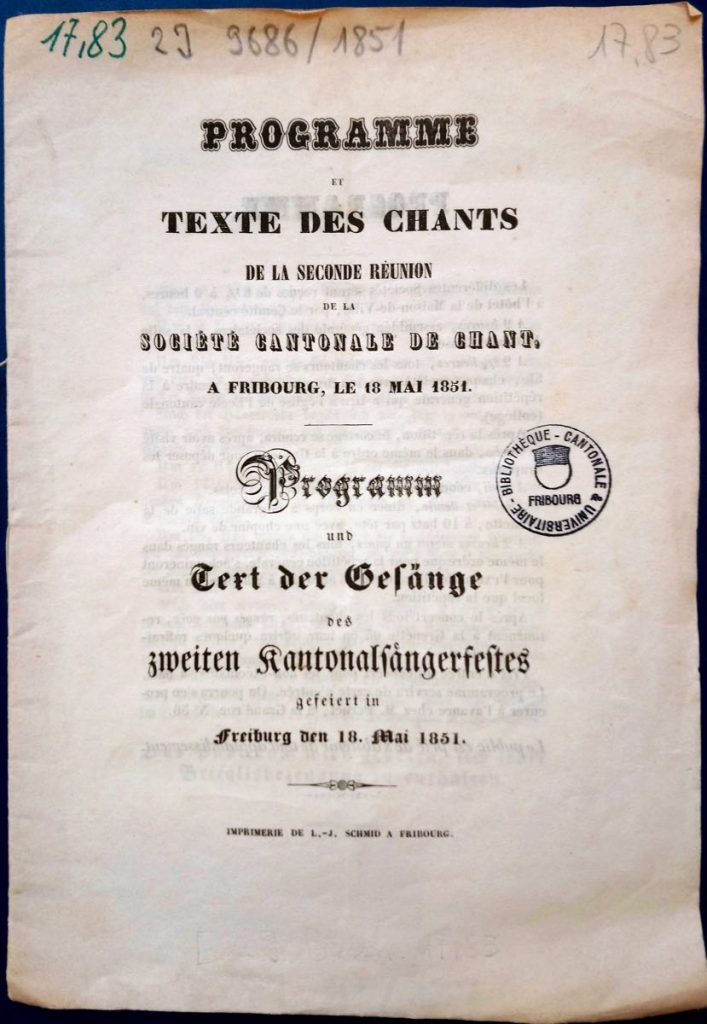
-
Société de Chant de la Ville de Fribourg
Since 8 June, the archives have been open again in Switzerland. CLEFNI’s data collection can resume! The aim is now to research documents of the choral societies founded in the city of Fribourg in the long 19th century.
The Société de Chant de la Ville de Fribourg (Singing Society of the City of Fribourg), the oldest men’s choir in the city, was founded in 1841. The picture below is from 1878 and shows the society with its founding director Jacques Vogt (1810-1869). Unfortunately, the choir no longer exists.
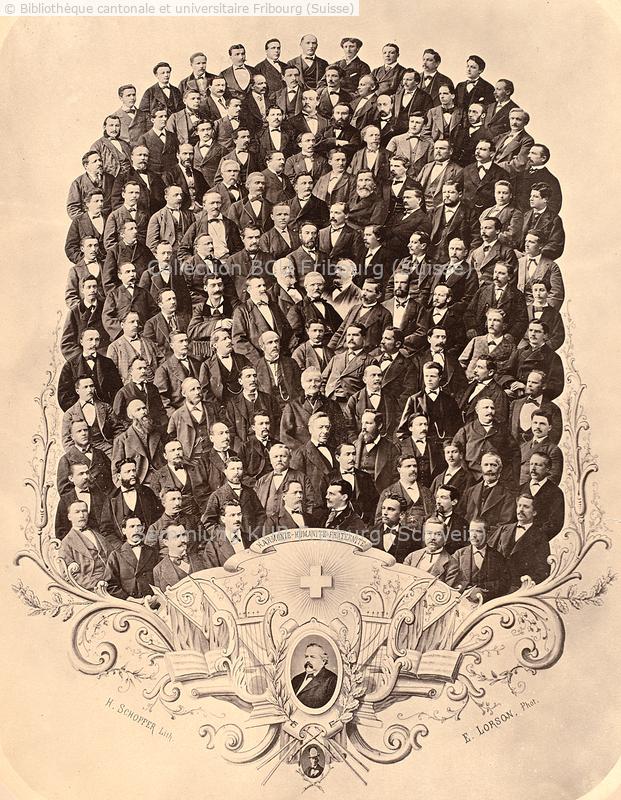
-
SNSF Scientific Image Competition: “Disclosing the past”
The last of the five entries by CLEFNI, displayed on the official Flickr gallery of the SNSF Scientific Image Competition:
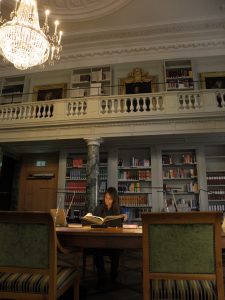
This picture portrays a regular working day at the Burgerbibliothek Bern during the data collection for my EU-H2020 project “CLEFNI – The choral life in the cities of Bern and Fribourg in the long 19th century”. Collecting historical data in such a place as the Burgerbibliothek can be an impressive experience. Its countless documents comprise centuries of history. The reading room itself is a historical monument. Side by side with such immensity, one can feel minuscule. Nonetheless, these documents may spend years or even centuries in an archive shelf, unless someone engages in studying them and discloses their past to the present.
-
SNSF Scientific Image Competition: “Past and present”
Fourth of the five entries by CLEFNI, displayed on the official Flickr gallery of the SNSF Scientific Image Competition:
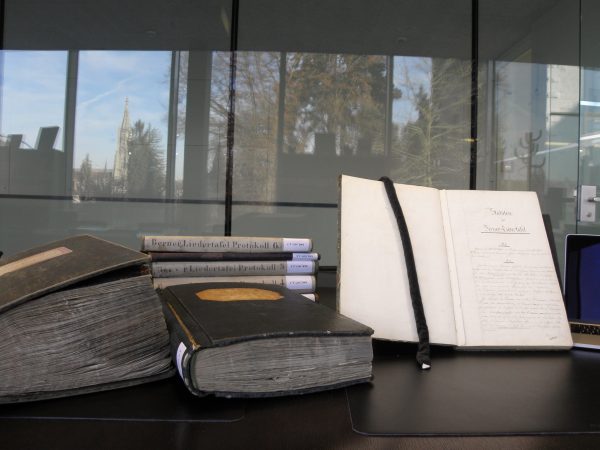
While collecting data for my EU-H2020 project “CLEFNI – The choral life in the cities of Bern and Fribourg in the long 19th century”, I look at Bern’s past and present. Old and new buildings, reflected in the glass wall of the Archive of the City of Bern, stand side by side with historical documents. In the background, today’s Bern discloses itself: the Berner Münster, autumn-coloured trees, and the backside of the Historical Museum of Bern. In the foreground, 19th-century documents of the Berner Liedertafel, the men’s choir founded in 1845 and dissolved in 2018, tell part of Bern’s history. Do archives reveal our past or our present?
-
SNSF Scientific Image Competition: “My favourite puzzle”
Third of the five entries by CLEFNI, displayed on the official Flickr gallery of the SNSF Scientific Image Competition:
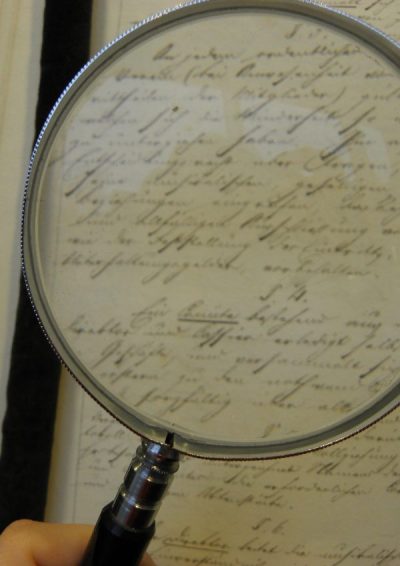
Collecting historical data is detective work. Finding the traces of something that has happened centuries ago demands not only deduction skills and critical thinking but also a lot of patience. For when you find the traces, this is where the puzzle begins. Deciphering ancient handwriting can be challenging, but it is a thrilling puzzle. I took this picture while solving one of the Kurrentschrift-puzzles of my EU-H2020 project “CLEFNI – The choral life in the cities of Bern and Fribourg in the long 19th century”.
This photo shows an excerpt of the statutes of the men’s choir Berner Liedertafel (founded in 1845), which is written in Kurrentschrift, an old form of German handwriting. The document is held by the Archive of the City of Bern. -
Digital annual report of the University of Bern
The 2019 annual report of the University of Bern has been published in digital format for the first time. It presents the University’s major accomplishments in a multimedia format.
In the Research section, CLEFNI is one of the highlights:
Bern as a destination for new talent from abroad
The University of Bern is also highly respected by ambitious postdocs from abroad, who have to apply for international grants in order to carry out a project at the University of Bern. Forty-two early career researchers applied for coveted EU fellowships in 2019 – an all-time high. Given that there are only enough funds to finance 12 to 14 percent of the applications received, these grants are extremely competitive. In a survey conducted by the Vice-Rectorate Research, postdocs indicated that the University of Bern is the perfect place for their research project. For example: Dr. Caiti Hauck from Brazil began in 2019 her fellowship project “CLEFNI: The choral life in the cities of Bern and Fribourg in the long nineteenth century” at the Institute of Musicology. She is looking into the question of how, at the emergence of the modern federal state in the 19th century, male choirs in Fribourg and in Bern promoted linguistic and religious integration.
-
SNSF Scientific Image Competition: “Enjoy the silence”
Second of the five entries by CLEFNI, displayed on the official Flickr gallery of the SNSF Scientific Image Competition:
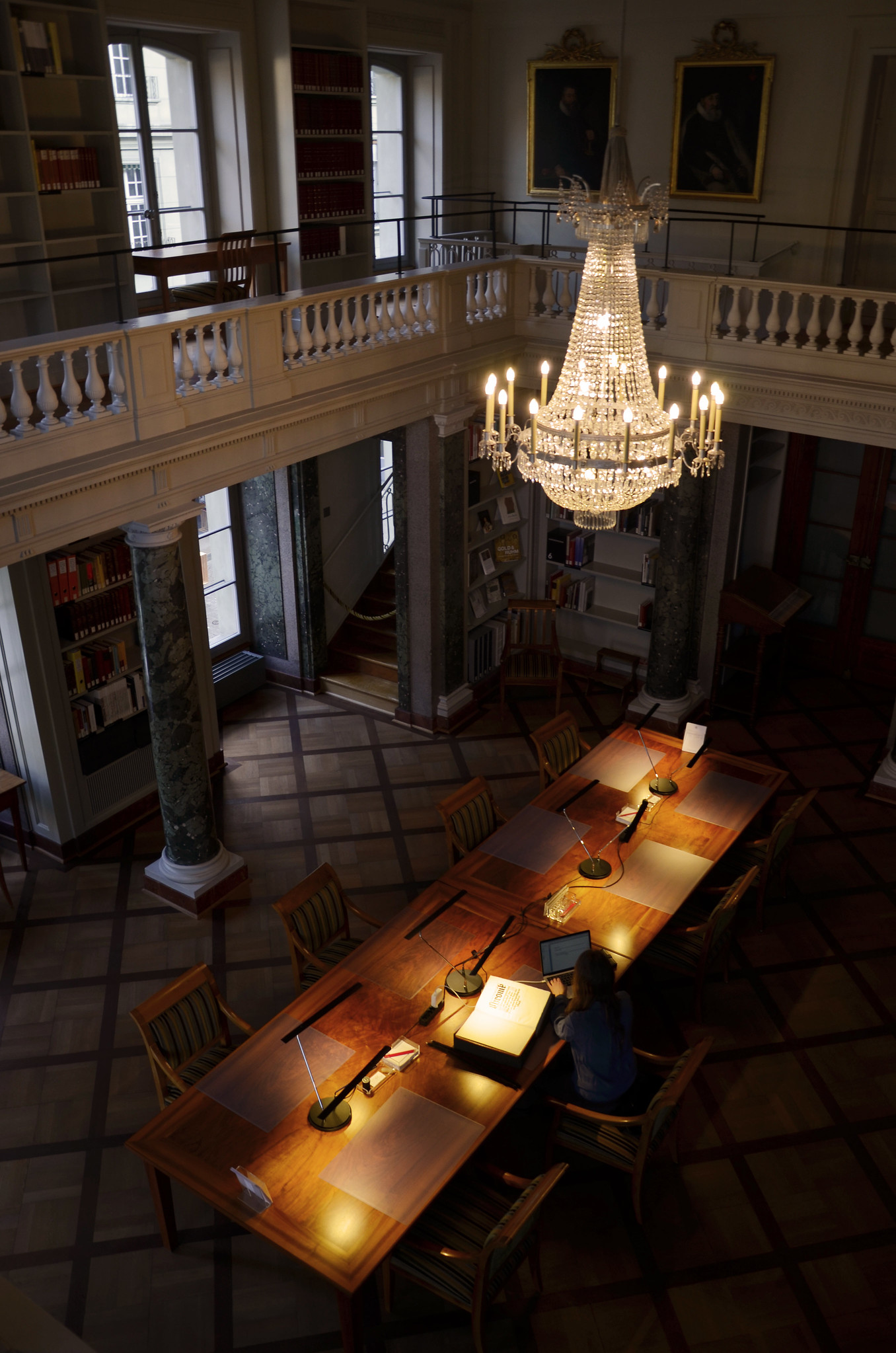
Archives — such as the Burgerbibliothek Bern — are the main places for collecting data for my project “CLEFNI – The choral life in the cities of Bern and Fribourg in the long 19th century”. In these places, I look for the choral activities of the past. I look for musicking — the taking part in music performance, as explained by Small — in places where silence reigns. In empty reading rooms, I look for the vestiges of crowded singing festivals. Travel chronicles and reports of activities trace the history of a still living choral life. Silence opens the doors to music.
-
SNSF Scientific Image Competition: “Materialised history”
CLEFNI has participated in the Scientific Image Competition by the Swiss National Science Foundation (SNSF)!
Here is the first of the five entries by CLEFNI, which are displayed on the official Flickr gallery of the SNSF.
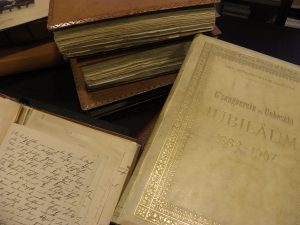
This photo shows different types of documents of the Uebeschi-Chor Bern, a men’s choir founded in 1882. On the foreground, one sees the golden cover of the choir’s 25th jubilee volume. On the top middle are three of the six massive volumes that describe the choir’s history from 1882 to 2012. On the bottom right, one sees the inner part of one of these volumes. The upper left side shows part of a picture of 1884.
-
Cäcilienverein der Stadt Bern
During the 19th century, most of the choirs of the city of Bern were men’s choirs. Nonetheless, there were also mixed choirs.
The Cäcilienverein der Stadt Bern (Society of Saint Cecilia of the City of Bern), founded in 1862, was probably the most famous. Renamed Oratorienchor Bern in 1973, nowadays it is the oldest mixed choir in the city of Bern.
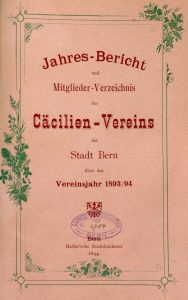
-
CLEFNI goes on!
Despite the coronavirus, CLEFNI’s work continues, but at home.
Early March the first milestone of the project has been achieved: data collection regarding the choral life in Bern has been completed. The next phase would be the collection of data in archives of choral societies in Fribourg. However, this task had to be postponed, since all archives and libraries are closed. CLEFNI’s researcher is, therefore, using this period of isolation to read the many books, articles, and documents that she has been collecting!
Here are two documents of the celebrations of the 700th anniversary of the founding of the city of Bern in 1891.
Firstly, the front page of the score of the “Dramatisches Festspiel” composed by Carl Munzinger for the occasion. Around 800 persons took part in the performance of this Festspiel, including several choral societies of the city and the canton Bern.
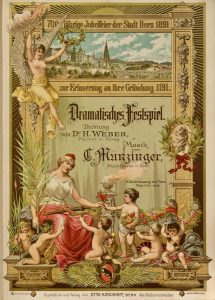
Secondly, the book cover of the official album with drawings of the historical parade, which took place as part of the festivities.
Are you curious to know what’s in this album? Take a look at the digitalised version provided by the Swiss National Library.
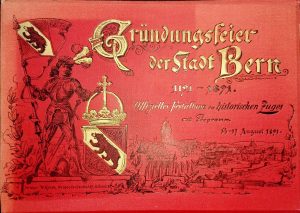
-
The woman behind CLEFNI
On the International Day of Women and Girls in Science, CLEFNI shows the woman behind CLEFNI!
Dr. Caiti Hauck examines archives for her MSCA research project on the choral life in the cities of Bern and Fribourg in the long 19th century.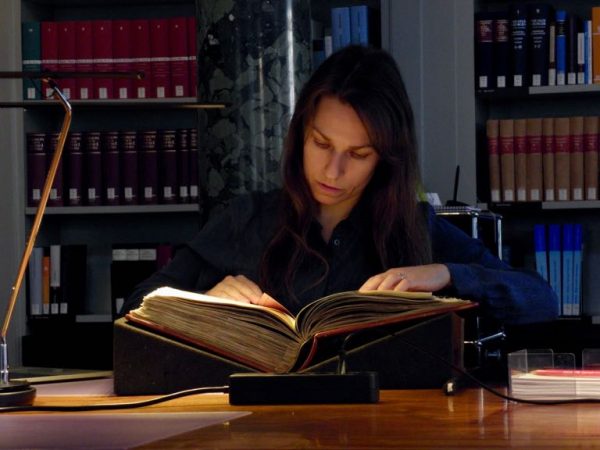
-
Cantonal Singing Festival in Bern in 1881
Admission ticket to the Cantonal Singing Festival in Bern, which was organised in 1881 by the men’s choirs Berner Liedertafel, Berner Männerchor, and Liederkranz Bern.
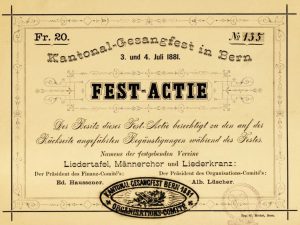
-
Cheers, 1898!
Invitation to the New Year party of the Sängerbund Länggasse.
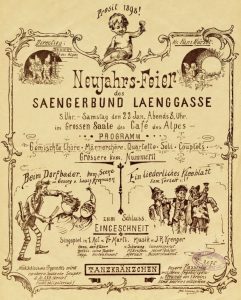
-
Berner Männerchor
Statutes of 1899 of the Berner Männerchor (Bern Men’s Choir), founded in 1870.
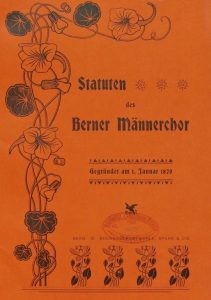
-
Berner Liedertafel
The men’s choir Berner Liedertafel was founded in 1845. Here is the first page of the programme of the banquet-concert to celebrate its 50th anniversary in 1895.
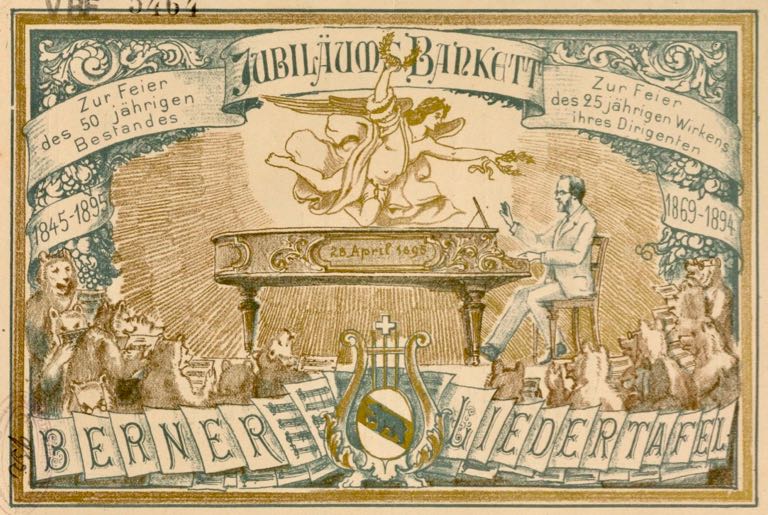
-
Handwritten sources from the 19th century
Many 19th century handwritten sources in German are written in Kurrentschrift, which is a handwriting used until the early 20th century.
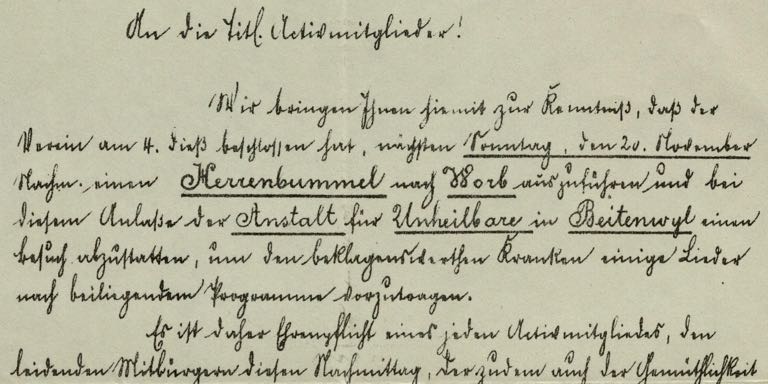
-
Liederkranz Bern
Programme of one of the festive events to mark the 50th anniversary of the men’s choir Liederkranz Bern, founded in 1849:
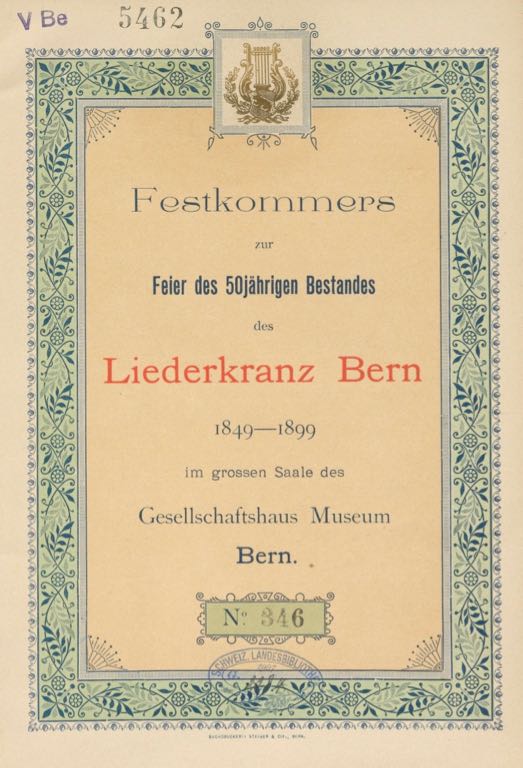
-
The Swiss National Library
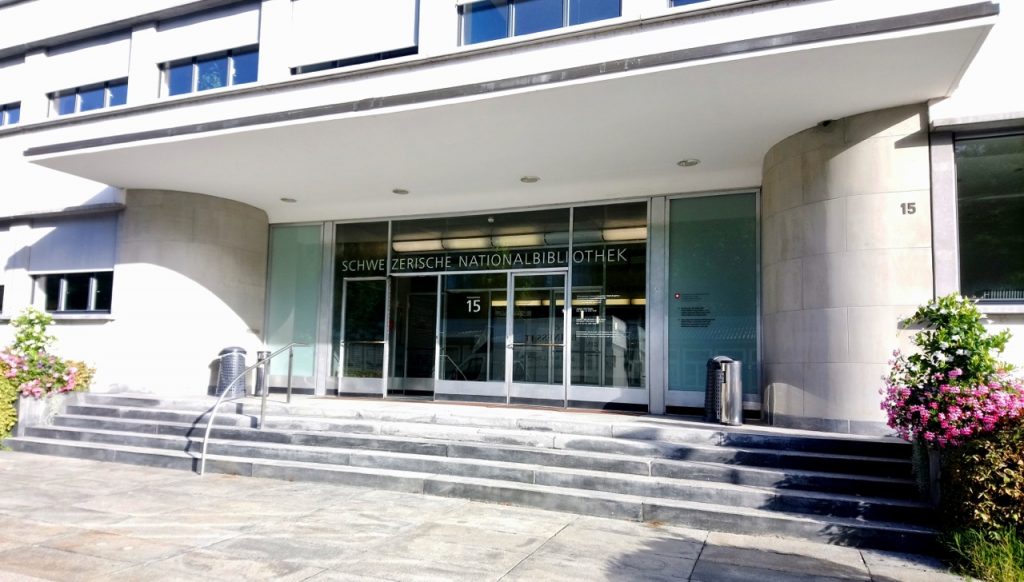
The collections of the Swiss National Library in Bern contain treasures of Swiss history, including numerous archives of choral societies.
Its infrastructure is excellent, its staff friendly and competent: an ideal place for research!
-
CLEFNI’s website launched
CLEFNI’s fully trilingual website is now online!
Find out about the aims of this research project, the researcher involved in its development, and related publications and events.
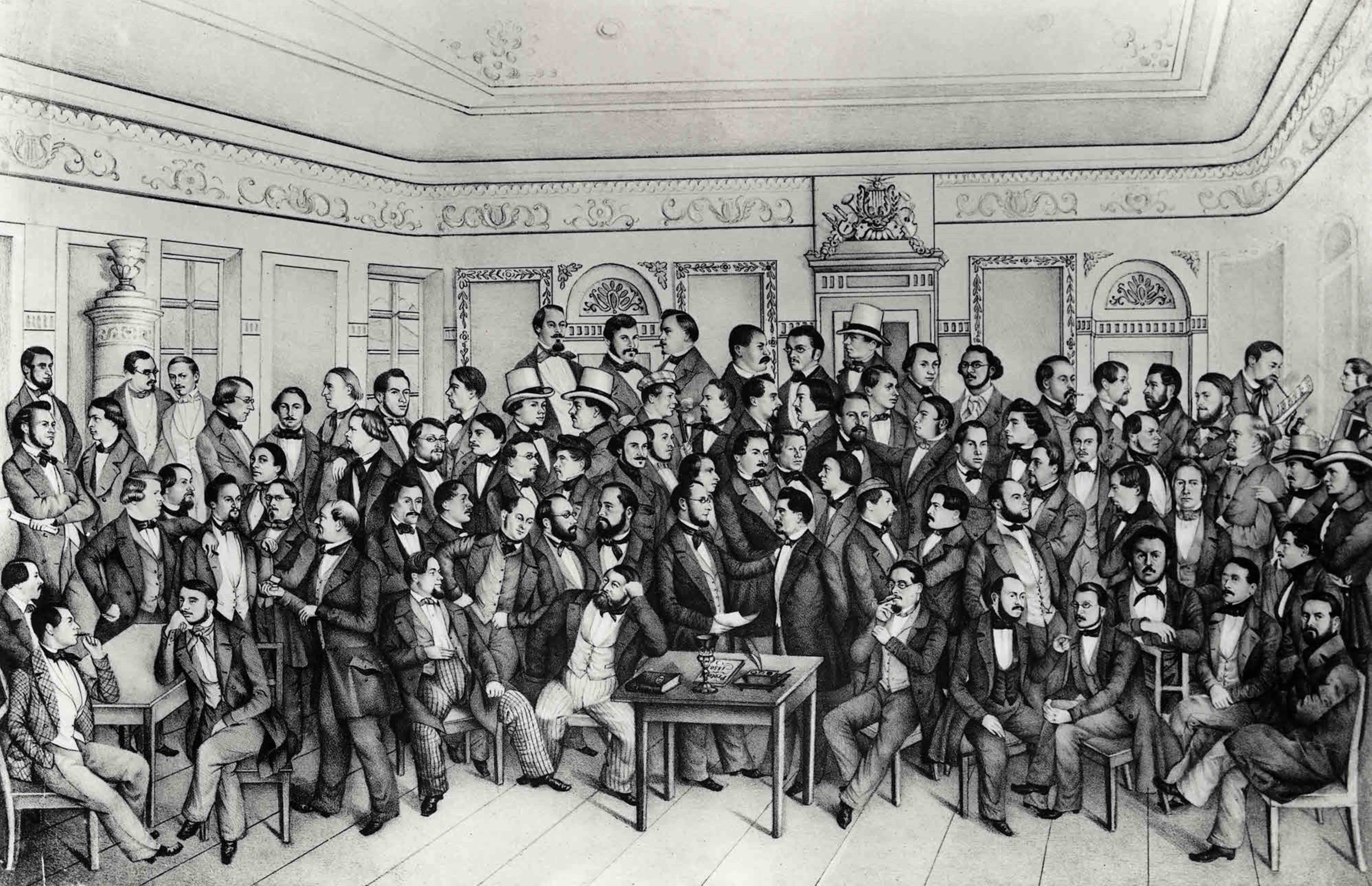
Die Berner Liedertafel 1850 im alten Casino. Lithographie von Ernst Neubauer del. Staatsarchiv des Kantons Bern, Signatur: T.D. Personen 57. 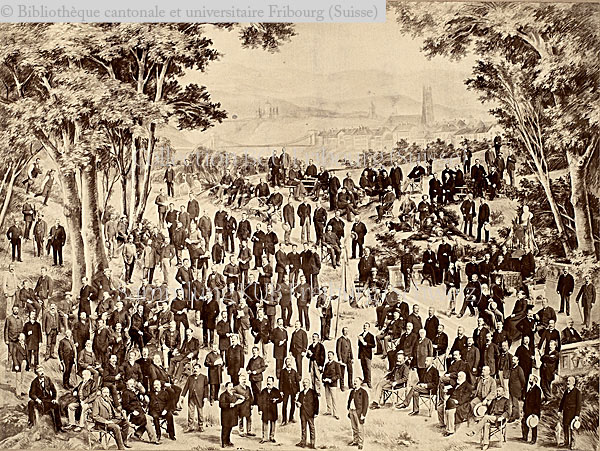
La Société de Chant de la Ville de Fribourg, 1891. Photographie de Ernest Lorson. Bibliothèque cantonale et universitaire Fribourg, No RERO R007582425